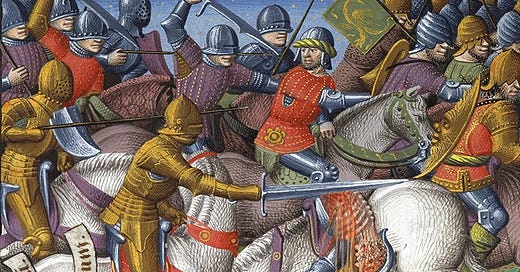If you are looking for the beginning of the study for The Song of Roland then you can go HERE for a brief introduction. At the bottom of the introduction you will find the links to each section of the study guide as it becomes available. If you would like to see the growing list of book studies available for free on this site you can go HERE. Enjoy!
Virtues/Vices/Great Ideas: (Find them in the Text)
Love, Recklessness, Courage
Grammar Questions: (The Information of the Text)
What did the Emer’s scouts report to him concerning Charles?
Who is at the very front of the Paynim forces as they march toward Charlemayn?
How does the poet describe the appearance of Baligant (the Emir)?
How does the poet describe the intelligence and character of Baligant?
To what did Baligant liken Charles’ forces without Roland, Oliver, and the other Peers?
To whom did Baligant grant the right of first attack against the French and what is promised to him?
How many total men make up the armed forces underneath the Emir’s command?
What formidable foes belong to Malprise’ column?
What image is on the Emir’s standard?
What did the men do who sought the “protection” of the Paynim gods?
What role did Emir Baligant say he would play personally in the coming fight?
What did Charlemayn tell his men they should do if they won't ride with him?
Logic Questions: (Interpreting, Comparing/Contrasting, Reasoning)
Why did Baligant name his sword “Précieuse”?
What did Baligant mean when he said of the French forces that they are like “an old glove”?
Compare the symbol on Baligant’s standard with Charlemayn’s dream in Laisses 185. What do you notice?
What does the text mean when it says, “Far as a man a peeled white wand could throw, King Baligant before his people goes”?
Compare and contrast the actions of the Emir (Baligant) with that of Marsilion’s behavior earlier in the book. What stands out as different between the two men?
Rhetoric Questions: (The Analysis of Ideas in the Text)
The text tells us, “Right gallantly the Emperor Carlon rides; / Over his byrny he lets his beard float wide; / For love of him the French all do the like: / These hundred thousand may thus be recognized.” What makes someone desirous to imitate? What do we hope to gain by imitating someone else? Ought we to imitate other people or should we just ‘be ourselves’? Explain your answer carefully.
Given the fact that Charlemayn was drastically outnumbered do you think his decision to ride to war against the Emir was prudent? If it was prudent, explain why. If it was imprudent, what should he have done? Defend your answer with reason.
Theological Analysis: (Sola Scriptura)
Read 2 Chronicles 13. What similarities do we see between this passage of Scripture and our current reading? How might this passage affect our thinking about Charlemayn’s decision to stand his ground and meet Baligant in battle?



